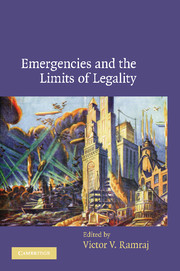Book contents
- Frontmatter
- Contents
- List of contributors
- Preface
- Introduction
- PART ONE Legality and extra-legality
- 2 The compulsion of legality
- 3 Extra-legality and the ethic of political responsibility
- PART TWO Conceptual and normative theories
- PART THREE Political and sociological theories
- PART FOUR Prospective constraints on state power
- PART FIVE Judicial responses to official disobedience
- PART SIX Post-colonial and international perspectives
- Index
- References
3 - Extra-legality and the ethic of political responsibility
Published online by Cambridge University Press: 10 August 2009
- Frontmatter
- Contents
- List of contributors
- Preface
- Introduction
- PART ONE Legality and extra-legality
- 2 The compulsion of legality
- 3 Extra-legality and the ethic of political responsibility
- PART TWO Conceptual and normative theories
- PART THREE Political and sociological theories
- PART FOUR Prospective constraints on state power
- PART FIVE Judicial responses to official disobedience
- PART SIX Post-colonial and international perspectives
- Index
- References
Summary
Whoever wants to engage in politics at all, and especially in politics as a vocation … lets himself in for the diabolic forces lurking in all violence.
Would not the burden on the official be so great that it would require circumstances of a perfectly extraordinary character to induce the individual to take the risk of acting? The answer is of course yes, that's the point.
Introduction
Public officials, like everybody else, ought to obey the law, even when they disagree with specific legal commands. However, there may be extreme exigencies when officials may regard strict obedience to legal authority as irrational or immoral. Public officials who believe that the law is so fundamentally unjust as to be devoid of both legitimacy and legality may exercise their discretion and refuse to apply, or seek actively to undermine, such law. The extra-legal measures model of emergency powers (ELM) invokes the possibility that public officials having to deal with extreme cases may consider acting outside the legal order while acknowledging openly their actions and the extra-legal nature of such actions and accepting the possible consequences. ELM has been challenged as embracing brazen lawlessness by placing public officials in a ‘legal black hole…a zone uncontrolled by law’. This chapter begins to address some of those criticisms.
- Type
- Chapter
- Information
- Emergencies and the Limits of Legality , pp. 60 - 94Publisher: Cambridge University PressPrint publication year: 2008
References
- 10
- Cited by

